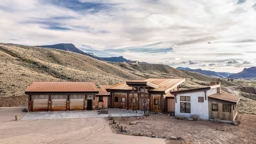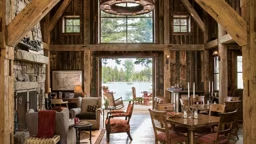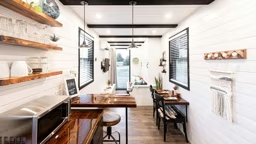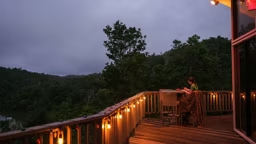
Close your eyes and envision your dream cabin … Does it come with a view of the water?
For many, cabin living means waterfront living. If you’re in search of your own shore haven, do your homework first to make the buying process go more smoothly. Engaging a local real estate agent who has experience with waterfront properties will help you cull your options.
“Every lake has its quirks, vastly different regulations and costs regarding dock permits. There might be seasonal variances in water levels, bridges that limit the navigation of certain boats or sections of lakes that are difficult to navigate,” says Brian Cauble of Lake Homes Realty in Pelham, Ala. A veteran agent, like Cauble, can help you avoid a big-ticket mistake. Websites like lakehomes.com, landwatch.com, unitedcountry.com and lakehomesusa.com are good places to start searching for available land or cabins. Renting a cabin through VRBO or HomeAway for a weekend can help you decide if a certain region is right for you.
Here's what else to keep in mind:
Access & Restrictions
As you search for buildable land or an existing cabin, be aware of accessibility. A view of the water is great, but you don’t want to just look at it; you want to be in it or on it. Is the property right on the main body of water or on a channel? Will you be able to put in a dock for swimming or boating? Does the site’s topography make it easy or difficult to get to the shore? Will you share water access as part of a community marina or swimming area?
If you love boating, be sure the property you’re considering accommodates it. Ask about restrictions on certain types of boats or motors. Are there plants, rocks or shallow water that make motor boating or water skiing difficult? Can you dock a larger boat right on the property or will you need a slip somewhere else? Can you build a boathouse or other shelter for your boat for the off-season? Is there a boat ramp on the site or at a public launch you can use?
If you prefer to paddle, watch for heavy motorboat traffic in the area that could make canoeing or kayaking less than relaxing. If your favorite boat is used for fishing, you should ask questions about the availability and ease of access to fishing spots, fishing regulations and local fish populations.
For the swimmers in your family, take note of which bodies of water are swimming-friendly. Easy access to shallow water is good for young children or those who prefer to just wade. Are there strong currents, rocks or weeds that make swimming difficult? What kind of dock or swimming platforms are allowed? Shelter from prevailing wind and waves can make swimming more comfortable. Pay attention to the property’s orientation and when the swimming area will be sunny.
If you plan to rent out your waterfront cabin when you’re not there, ask your real estate agent about the rental market in the area. Are there agencies in town that can help you book, clean and maintain the cabin? How long is the rental season? How much do renters typically pay? Are there any codes or restrictions that forbid renting the property?
Keeping Up Appearances
“By definition, lake property is more exposed to the elements, and the repairs will add up faster,” Cauble says. “People are most often surprised by maintenance costs unique to waterfront property, like dock or seawall expenses, and by the cost to install and maintain a septic tank.”
If you are buying an existing cabin, inspect existing retaining walls, docks or boathouses carefully. Find out if an existing septic tank has been well maintained.
If the property is raw land, talk to your agent, the neighbors or a local contractor about the costs for installing waterfront structures and a septic tank. What kind of maintenance is needed for the beach or shoreline?
A homeowners’ association or municipality may take care of the tasks. What would the dues or fees for these services be?
Seasonal cabins require specific maintenance. Does the cabin make the necessary preparations easy, or are there service providers in the area who will close up the cabin for you?
The Bottom Line
Know what you can afford before you start searching. When budgeting, keep expenses like insurance and property taxes in mind. Waterfront land is often worth more than the same size lot inland, explains Dan Anderson, an agent with Lake Homes Minnesota, so taxes will be higher.
“In many lake areas, cellular and cable TV coverage is not dependable or available, so there is a small ongoing expense to solve those problems,” Cauble says. “Also, people generally spend more on their ‘toys’ than they anticipated – boats, Jet Skis and equipment, all the things that go with living on the lake.”
The good news is that a cabin on the water should maintain its value over the long-term. “Nationally, waterfront homes are worth more than double the value of homes overall,” according to Zillow. Values will vary depending on your region, but overall, waterfront property is a sought-after commodity with a fixed supply.
What's Up With Teardowns?
Buyers eager to score a dream waterfront spot might plan to buy an existing cabin, tear it down and rebuild. That plan may or may not work, advises Dan Anderson, a waterfront specialist broker in Grand Rapids, Minn.
Homes built prior to 1972 in his area weren’t restricted by the setbacks currently mandated by today’s shoreline management programs. “Some counties may give some leeway,” he says, but in general, a new home would be required to sit much further back from the shoreline. You also might need to put in a new septic system, which can’t be placed in the same spot as an old tank. Searching for land that offers two separate septic sites means you’ll need at least an acre, Anderson says.
Remodeling rather than razing is a possibility. Be sure to ask about code restrictions on additions though; some municipalities will limit how large additions can be and how much of the original building must remain intact.
See also: Is Your Property Lake Friendly?










